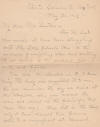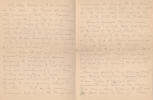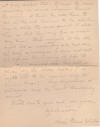“Struggling with ‘The Little Colonel’s Hero’”
A letter from Annie Fellows Johnston to Mrs. Lawton (“Mrs. Walton” in the Little Colonel stories.) It’s interesting that this was sent from Walton, New York. More interesting is once again the evidence of the tremendous amount of influence that Mrs. Lawton had on the development of the Little Colonel series. (Maybe she should be listed as co-author?) This letter answers many of the heretofore unanswered questions about “The Little Colonel’s Hero,” and raises some more.
 [Here we see Annie Fellows Johnston acknowledge that Mrs. Lawton suggested the story of Hero to her, as well as the origin of Hero the war dog]
[Here we see Annie Fellows Johnston acknowledge that Mrs. Lawton suggested the story of Hero to her, as well as the origin of Hero the war dog]
Walton, Delaware Co. New York
May 20, 1902
My Dear Mrs. Lawton–
For the last two weeks I have been struggling with “The Little Colonel’s Hero” to the exclusion of everything else, and writing to all points of the compass for facts and figures.
You will be interested in it, I know, being the lady who suggested it to me. Do you remember the day we dined at Mrs. Warfield’s, when you crossed the room and showed me the picture of the Red Cross War dog? Well that is the Hero, only I have changed him from a collie to a magnificent St. Bernard.
 [In this section we find out that Annie Fellows Johnston was acquainted with Clara Barton and received much of the material for the Red Cross story from Clara herself.
[In this section we find out that Annie Fellows Johnston was acquainted with Clara Barton and received much of the material for the Red Cross story from Clara herself.
We have often suspected that somehow Mrs. Lawton was involved in dealing with the Red Cross during her tour with her husband, General H. W. Lawton, in the Philippines. It’s a shame that the reply to this letter has apparently been lost, as it looks like it could have been very interesting.
This is also the first time we’ve seen Annie Fellows Johnston directly equate her story characters with those of real life. Notice, she says “There will probably be a camping party … which YOU chaperone” instead of a camping party that Mrs. Walton chaperones.]
The Little Colonel is to go abroad in this book. In Geneva she comes into possession of Hero, in a dramatic way, and there in that home of heroes and in the cradle of the Red Cross movement itself, she becomes acquainted with the history of the Association and all that it has accomplished for humanity in the times of flood, fever, famine and fire as well as war.
Today, Clara Barton sent me a pile of reports and histories and speeches concerning it, which will help me amazingly. I wanted to ask if you have ever met her, and if you have, if there was anything in your acquaintance which I might be given in this story to add a personal touch to this work. Also, did the nurses, ambulance corps, etc, in the Philippines work under the flag of the Red Cross? I have found nothing later in the reports than the Cuban war, but supposed they were at the front also in the Philippines.
From Switzerland, the Little Colonel goes to Tours and meets Betty and Eugenia at the Gate of the Giant Scissors.
They all return to the Valley in the fall where they find the Waltons ensconced in their new home in the country.
I should like to call it by name. What can you suggest? Maybe if you have found a name for your place, you would not object to my referring to it by its real name.
 There will probably be a camping party near Bashes which you chaperone, and I am thinking of having a state encampment near there at the same time where a sham battle is fought and Hero shows his training. Have
There will probably be a camping party near Bashes which you chaperone, and I am thinking of having a state encampment near there at the same time where a sham battle is fought and Hero shows his training. Have
[At this point Annie Fellows Johnston is still trying to work out the ending for Little Colonel’s Hero. Wonder where she came up with the idea for the real ending to the story?]
not fully decided that. Of course he saves somebody on several occasions through the story. I think he will have to die in the end however to be artistic — maybe while the encampment is still there so that they may fire a salute over him. Then wouldn’t it be all right for a noble war dog who had done his duty as bravely as a man and lost his life in the saving of a life to have “taps” sounded over his resting place by The Little Captain? or ought that to be reserved only for human heroes? Any suggestions or criticisms will be most thankfully received.
With love to you and all yours
Affectionately
Annie Fellows Johnston